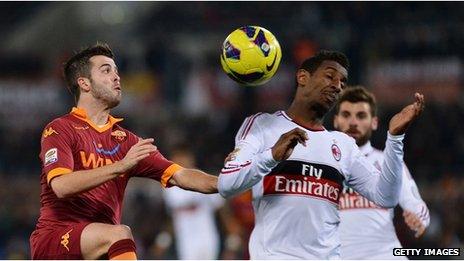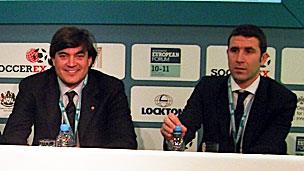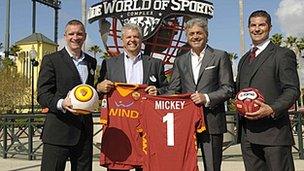Football clubs go global with social media
- Published

AS Roma and AC Milan are looking to expand their fan bases out of Italy to attract a bigger international audience
Football clubs are no longer content to sit back and take their fans for granted in a global digital age that allows teams in other countries to become both sporting and commercial rivals.
When AS Roma was bought by a US-based group of investors two years ago, the club had only a flash website in place, with no e-commerce portal, no social media and no mobile apps or games.
But despite that slow start, the Italian side has been among the most pro-active in their use of the likes of Facebook and Twitter in order to monetise their large fan followings.
"When the team was purchased, AS Roma was the most under-marketed brand in the world," declares Shergul Arshad, digital business director at the club, who has previously worked at Amazon and Time Inc.
He said the club should be capitalising on an estimated 30 million tourists that come through the city every year. "But AS Roma had been very focused [on fans] just in and around the city limit," he says.

Italian clubs are looking to compete with others from Europe in a global social media marketplace
But by moving into the social media and digital sphere the intention has been to take AS Roma beyond those limits to fans around the world - and at the same time increase awareness of the club's brand.
"Social media is opening up international communication strands that did not exist before," he told delegates at the Soccerex football business convention in Manchester.
But it is a crowded global market place, with many other European clubs seeking to grow a global fan base, particularly in regions such as south-east Asia and China, and North America.
And he admits that when he first came into his post 18 months ago, the club was well behind some English clubs, such as Liverpool, which had had digital strategies in place for a decade.
Supporter insights
"We have brought in an e-commerce and social media strategy," he says, adding that a major part of that has been leveraging the popularity of the club's star players, many of whom have Twitter accounts.
He says the "giallorossi " (yellow-and-reds) are now one of the fastest growing clubs on Twitter, picking up followers at a faster rate than the likes of other global brands such as Celtic or Bayern Munich.
The club also has a hardcore of a few dozen supporters, among their total 168,000 followers, who tweet a vast amount of information and news about the club.
"We are following those fans and their insights," says Mr Arshad. "We retweet a lot and the fans really appreciate this.
"Meanwhile, in its first six months on Facebook the official AS Roma account had one million likes." The figure is now close to 1.5 million.
He says establishing the right tone on Facebook has been important, and the club has tried to avoid being too "corporate".
"Our basic attitude is that we have to let our fans vent [their frustrations] or celebrate on our Facebook page, because otherwise they may go elsewhere," he says.
Female fans
Other platforms which the club uses include Youtube and Pinterest.
The latter might seem a bit unusual, being what Mr Arshad describes as principally a "shopping community", and one whose users are overwhelmingly female.
"It was an opportunity to move into a different demographic and appeal to a new female audience, and it also ties in with our e-commerce and international approach," he says.

AS Roma signed a training camp deal at the Disney-owned Wide World of Sports complex in Florida
Having established such a comprehensive programme of connections in a relatively short space of time, he says the "priority of our commercial partners is to access our international fan base".
Mr Arshad says it is this growing social media presence which helped entice sportswear giant Nike to sign last month a 10-year deal to be the club's official kit supplier from the 2014-15 season.
And he also points to the club's agreement with Disney to hold the club's winter training camp at the US firm's Wide World of Sports complex in Florida.
"These brands are interested in advertising on our social media platforms," he says. "They are also interested in reaching those 30 million visitors who come to Rome every year."
'Fantastic tool'
Giuliano Giorgetti is the head of web and new media at AC Milan, having worked at the seven-times winners of the European Cup for 10 years.
"It is important that there is a digital culture that is growing interest in the club," he says.
"Social media is really a fantastic tool for the process of internationalisation of an Italian football club."

AC Milan tweets in a number of languages, including English, Spanish, Portuguese and Italian, as seen here
As well as the official club website and mobile phone applications, AC Milan is also active on social networks such as Facebook, Twitter, Youtube, Google+, and Flickr.
From 300,000 Twitter followers in January 2012, the "rossoneri" (red-and-blacks) now have one million.
"It enables us to have direct communication with international fans, and we tweet in a number of languages," says Mr Giorgetti.
"All our tweets are in Italian and English, and there is some localised content in other languages… if our marketing team has a specific objective."
Indeed, he says that more than 70% of the club's Twitter followers come from abroad.
'Passion'
Meanwhile, the club's Facebook page has an impressive 15 million likes, again with a predominantly overseas presence.
For AC Milan there are three areas of monetisation around social media; sponsorship, e-commerce including merchandising and tickets, and licensing.
And Mr Giorgetti says there are different commercial goals associated with each social media platform.
He points to the fact that being on Google+ helps boost the club's presence on Google search, while being on Youtube brings in advertising around its content on that platform.
Mr Giorgetti says that digital not only drives more fan engagement, but helps AC Milan's business too.
And Mr Arshad at AS Roma agrees.
"Our audience has this passion, this is something that sponsors noticed and wanted to be involved with," he says. " It has generated a lot of money for us."